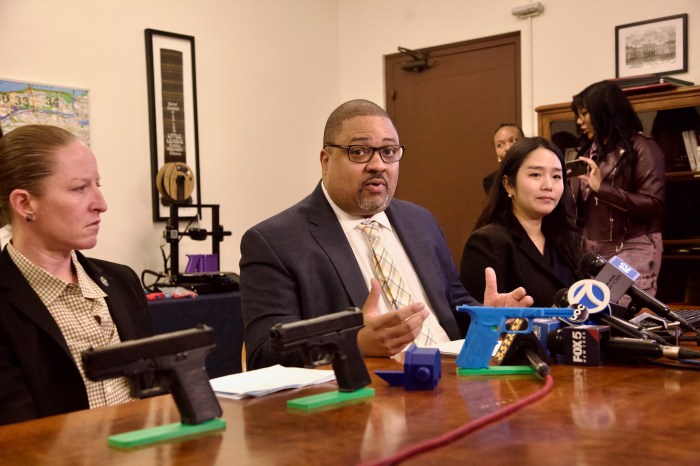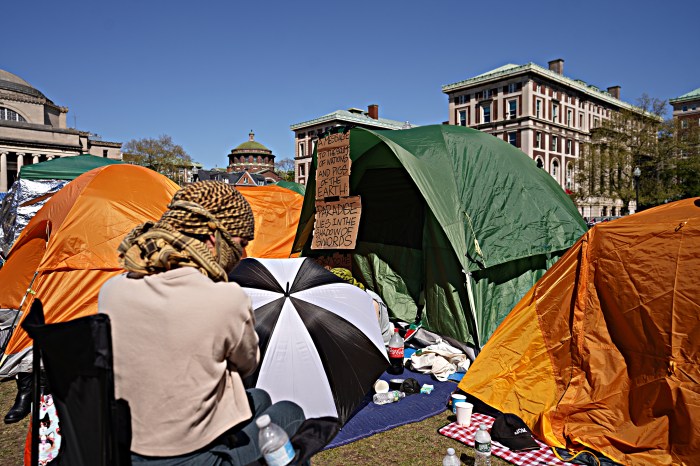BY WINNIE McCROY & SCOTT STIFFLER | On the evening of November 10, about 75 Chelsea residents gathered at the Church of the Holy Apostles for a two-hour community forum on the proposed expansion of Chelsea Market by its owner, Jamestown Properties. The majority of those who spoke opposed plans to build office space and a business hotel atop the historic building.
Hosted by Rev. Glenn B. Chalmers and moderated by former New York Supreme Court Justice Karen Smith, the panel consisted of Robert Benfatto, District Manager of Community Board 4 (CB4); Save Chelsea member David Holowka; and Fulton Houses Tenants Association President Miguel Acevedo.
The forum began with a straw poll on 10 issues of importance to the community related to the proposed expansion — including air and noise pollution, quality schools located in the neighborhood and safety. Receiving the most showing of hands: no overdevelopment, or when done, done in proportion to the community (19); less air and noise pollution (16); and affordable housing (15).
Benfatto then presented his report on the status of the zoning proposal, noting that the actual proposal would only come after city certification (around January 2012). At that point, the Uniform Land Use Review Procedure (ULURP) process will began — with CB4 having 60 days to review the proposal.
The committee will bring recommendations to the next full board meeting, and public hearings will be held. Benfatto encouraged the community to be vocal in all parts of this process.
Presentations by Holowka and Acevedo followed, with each having 15 minutes to argue their position, against and for, respectively.
“Jamestown, the company behind Chelsea Market, says that they are interested in preserving the character of our neighborhood…but our research leads us to believe that may not be accurate,” said Holowka. Citing the company’s acquisition and resale of landmark structures like the GM building and 620 Sixth Avenue, Holowka said that Jamestown was primarily interested in profits.
“I’m not against capitalism…but it’s time to put on the brakes,” said Holowka, citing overdevelopment, soaring rental prices, and congestion. Holowka also noted that the Caledonia (located on 16th Street across from Chelsea Market) was only allowed to reach 250 feet to build out all of their allowed area.
“Jamestown’s proposal would make the deliberately sculpted and already-built form of the substantial Caledonia irrelevant, and the High Line would be plunged into a canyon where it passes between the two buildings,” said Holowka. “Jamestown’s 250-foot tower addition would stand due south of and cast shadows on key High Line features.”
In a November 11 phone interview with Chelsea Now, Acevedo noted that Fulton residents are the ones most affected by changes to character, light and air. “Even those Caledonia residents, they weren’t worried about the lighting they took from us at Fulton Houses when they built that to 250 feet,” he said. “Their attitude was they paid for it. They gave no thought about us, and we didn’t get anything out of it. Now it’s as big as a high rise.”
Holowka characterized Jamestown Properties’ required $17 million payment toward upkeep of the High Line as “just a bribe,” saying, “If Jamestown’s zoning proposal is approved, it will amount to the corruption of urban planning with money.”
In a letter to sent via email on November 14, Save Chelsea further clarified their assertion — recalling a Q&A in the November 2 edition of Chelsea Now in which Phillips was asked what the project’s benefits to the community would be (other than a one-time $17 million donation to the High Line). “Mr. Phillips couldn’t name one besides increased tax revenue,” Save Chelsea noted, “which of course could come from new construction anywhere else in the city, and as nearby as the vacant and underdeveloped lots right across 15th Street.” The group’s letter continued, noting that, “New construction elsewhere might have the great advantages of generating tax revenue without requiring a zoning change or detracting from the High Line or the historic Chelsea Market complex itself.” As for the statement by Phillips that “the funds don’t go to the High Line. They go to the City of New York,” Save Chelsea asserts, “The funds in fact go to a special High Line maintenance fund managed by the city.”
Holowka closed his allotted time period by saying that, regardless of Jamestown’s renderings, a zoning change would allow them to demolish the entire complex — noting that “tearing down and building back new from the ground up is much cheaper than adding substantial construction on top of delicate and unpredictable historic construction, up through which new support structure, fire stairs, elevators and mechanical systems must be build from the ground.”
When speaking with Jamestown Properties Managing Director Michael Phillips over the phone on the morning of November 11, he told Chelsea Now, “The ground floor concourse will not be directly impacted. The idea is to build a platform on top of the west end of the building and create a structure on the Ninth Avenue corner so it won’t negatively impact the structure of Chelsea Market. That’s why it has taken so long to get where we have, because it is a delicate building project.”
In their November 14 letter to Chelsea Now, Save Chelsea countered: “Jamestown’s statement that it will ensure ‘that no development happens over historic portions of the market,’ is impossible, given that the whole block is listed on the State and National Registers of Historic Places….Part of Jamestown’s proposed hotel would rise above William A. Boring’s elegant three-story 1906 Strasser stable fronting on 16th Street near Ninth Avenue. Chelsea Market’s State and National Register listing protects it only from publicly funded alteration. Using its own private funds, Jamestown is free to demolish Chelsea Market.”
Directly following Holowka’s remarks, Acevedo then took the podium to argue in favor of the expansion.
“The saddest part is that we’re not here to be divided and conquered. Until the paperwork is submitted, there is no real proposal, so to hold up [the rendering] is a disservice, ” said Acevedo — who noted that during the straw poll, only two members (both Fulton Houses residents) raised their hand to indicate the importance of jobs and job training.
“One of the biggest things is to give jobs to the community, and Jamestown has given us job training, scholarships, youth Greenmarkets. They are the only corporation in the community that have not forgotten that Fulton Houses exists in this neighborhood,” he said.
He urged the community to work together to find jobs for the youth of Fulton Houses, and to work with Jamestown to improve the community by providing affordable housing, improving parks such as the one on 17th Street, and installing public restrooms. “Why can’t we compromise?” asked Acevedo. “We have to ask them to work with us to keep this diverse community together. I need your help to help the poor people in Chelsea. I don’t believe Jamestown will move into this community and leave.”
Community voices grievances
The open forum portion of the evening brought a dozen speakers before the crowd, all opposed to the expansion. Although Jamestown Properties was not invited to this forum (despite their request to attend), Chelsea Now brought these concerns to them for comment.
Carol Demech cited the “devastating environmental impact,” including gridlock, pollution and noise. She questioned their motive for building a hotel she felt was not needed, adding that job claims were inflated. “The millions of dollars to the High Line I see as a bribe,” she said.
In their November 11 phone interview, Jamestown refuted this characterization — noting that they had no participation in the calculation of the amount of the capital contribution required to increase their FAR (floor area ratio) — which they say was overbuilt in the course of 100 years, and under their calculations was still lower than their neighboring buildings. “This capital contribution goes to the City of New York, and is earmarked for the maintenance of the High Line,” added Phillips.
Speaking during the open forum, Greenwich Village Society for Historic Preservation Executive Director Andrew Berman took Jamestown’s claims of altruism to task, maintaining, “It’s about greed, not need. They are asking for the rules to change to make more money. There is very little benefit to the neighborhood…and once they get the permits from the city, they can sell it the next day.”
“I would reiterate that our new financing in this building would prohibit us from selling in the next seven years, so we’re here for certainly a long time,” countered Phillips. “But also we see Chelsea Market as seminal to our company’s identity moving forward. In no way do we have an interest in selling the building.”
Robert Trentlyon said that Pier 57, the art district and the Chelsea Historic District had enhanced the neighborhood — and that nine out of ten people he had spoken to were “repulsed” by the proposed addition. He also challenged the issue of job creation.
“I think we all appreciate the few scholarships that Jamestown has given, but let us not forget that the landlord doesn’t tell his tenants whom to hire,” said Trentlyon. “These jobs would be for experienced programmers, not jobs available for residents of Fulton Houses…. The great irony is that all these programmers, who would be making over $100,000, would want to move into Chelsea and either go into new high rise luxury buildings or end up displacing long-time residents.”
Michael Levine, a Chelsea resident since 1992, held up a stack of petitions, saying that 2,000 Chelsea people were against the expansion. He also noted that there was no way to predict the number of jobs the project would create.
Jamestown said that the expansion would, “bring more year-round employment at all skill and technical levels. I maintain that media and tech are the most open platforms in terms of the level of education in the market, as are culinary arts and hospitality in terms of being able to provide jobs,” said Phillips. “We are proposing all uses: jobs through construction projects, ancillary jobs created through the Market, plus related jobs within the community.”
Save Chelsea Treasurer Judy Richheimer said that she was a volunteer for the High Line, but became hesitant when they asked her to give tours. “I was beginning to feel like the growing success was a pyrrhic victory. Too many accommodations were made, and the lovely view that you get from walking on an elevated train line was destroyed,” said Richheimer.
Of those buildings included in the Special West Chelsea Zoning District, she said, “Deals have to be respected. We gave up a lot for the High Line deal…and we need to stand together and show that we’re not going to be pushed any further.”
The final speaker, longtime Fulton Houses resident Lenny Rosado, said he was conflicted about his decision, and that “I think we need to sit down with Jamestown and see what they have for us. Our kids need jobs to look forward to. We need to listen to both sides, and work as a community here…to see what we can get out of this.”
Smith bemoans lack of consensus
Representatives from Jamestown Properties were asked not to attend the event. “We were just asking to listen, not to participate in presentations, but to be spectators, attendees, because we want to continue our dialogue,” Phillips told Chelsea Now.
Speaking with Chelsea Now directly following the conclusion of the forum, Smith explained that in her past arbitration work, it was valuable to have the community gather to discuss the issue and come to consensus before engaging the opponent.
“Eventually, there will be a meeting with Jamestown, and we need to get our stuff together. They are the ones who divided us, because they went to Miguel and started offering him things, not realizing there was going to be an opposition, so they’re the enemy,” said Smith. “I didn’t want them here for this. Their talking would not have helped us at this point. In the future, that will be great. I’m an arbitrator/ negotiator/ judge. You never have the enemy in the room. You have them come in later on.”
Smith pointed to the current struggle between West Harlem and Columbia University as an example of what the process could devolve into if community consensus was not achieved.
“The worst thing that can come out of this is divide and conquer,” said Smith, echoing Acevedo’s remarks. “People came in here with their minds made up. I’m disappointed personally,” and disappointed in this meeting, she said. Smith indicated that in the future, she would not invest her time toward moderating similar events if participants were hostile toward her, and unwilling to seek compromise.
“Save Chelsea seems to be so rabid, if you don’t totally agree with them then you’re on the other side,” said Smith. “I’m not. I think what I said: both sides are going to hurt as a result of not coming together.”
Acevedo reiterated this in a phone interview the day after the meeting, telling Chelsea Now, “I thought we had the goal to create some kind of relationship with the developer, for better or worse. It just seemed like the usual opposition to it, with Save Chelsea and Bob Trentlyon always coming with negativity. They don’t see how the lives at Fulton Houses are impacted.”

















